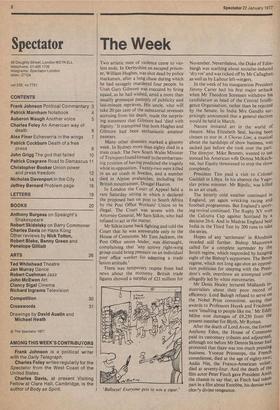The Week
Two artistic men of violence came to violent ends. In Derbyshire an escaped prisoner, William Hughes, was shot dead by police marksmen, after a long chase during which he had savagely murdered four people. In Utah Gary Gilmore was executed by firing squad, as he had wished, amid a more than usually grotesque panoply of publicity and last-minute reprieves. His uncle, who will take 20 per cent of the substantial revenues accruing from his death, made the surprising statement that Gilmore had 'died with dignity.' It transpired that both Hughes and Gilmore had been enthusiastic amateur painters.
Many other disasters marked a gloomy week. In Sydney more than eighty died in a train crash. The New South Wales Minister of Transport found himself in the embarrassing position of having predicted the tragedy while in opposition. Twenty-two were killed in an air crash in Sweden, and a number died in Alpine avalanches, including the British mountaineer, Dougal Haston.
In London the Court of Appeal held a rare Saturday sitting in which it declared the proposed ban on post to South Africa by the Post Office Workers' Union to be illegal. The Court was severe with the Attorney General, Mr Sam Silkin, who had refused to act in the matter.
Mr Silkin 'came back fighting and told the Court that he was answerable only to the House of Commons. Mr Tom Jackson, the Post Office union leader, was distraught, complaining that 'any screwy right-wing group could bring pressure on an individual post office worker for adopting a trade bnion attitude.'
There was temporary respite from bad news about the economy. British trade figures showed a surplus of £21 million for November. Nevertheless, the Duke of Edinburgh was scathing about socialist-induced 'dry rot' and was ticked off by Mr Callaghan as well as by Labour left-wingers.
In the week of his inauguration President Jimmy Carter had his first major setback when Mr Theodore Sorensen withdrew his candidature as head of the Central Intelligence Organisation, rather than be rejected by the Senate. In India Mrs Gandhi surprisingly announced that a general election would be held in March.
Nature imitated art in the world of theatre. Miss Elizabeth Seal, having been chosen to star in A Chorus Line, a musical about the hardships of show business, was sacked just before she took over the part. The director, Mike Bennett, wanted to use instead his American wife Donna McKechnie, but Equity threatened to stop the show completely.
President Tito paid a visit to Colonel Gaddafi in Libya. In his absence the Yugoslav prime minister, Mr Bijedic, was killed in an air crash.
The bitterly cold weather continued in England, yet again wrecking racing and football programmes. But England's sporting revival continued. The Rugby XV won the Calcutta Cup against Scotland by a decisive 26-6. And in Madras England beat India in the Third Test by 200 runs to take the series.
Hopes of any 'settlement' in Rhodesia receded still further. Bishop Muzorewa called for a complete surrender by the Smith regime, which responded by hanging eight of the Bishop's supporters. The Benin regime, which not long ago shot an opPosition politician for sleeping with the President's wife, overthrew an attempted couP allegedly led by white mercenaries.
Mr Denis Healey lectured Midlands industrialists about their poor record of efficiency. Lord Balogh refused to serve on the Nobel Prize committee, saying that awards to Professors Hayek and Friedman were 'insulting to people like me.' Mr Eddy Milne won damages of £9,250 from the present member for Blyth, Mr Ryman.
After the death of Lord Avon, the former Anthony Eden, the House of Commons paid its customary tributes and adjourned, although not before Mr Dennis Skinner had protested that there was too much pressing business. Yvonne Printemps, the French comedienne, died at the age of eighty-two; Andis Nin, the Franco-American writer, died at seventy-four. And the death of the film actor Peter Finch gave President Arrdll the chance to say that, as Finch had taken part in a film about Entebbe, his demise was cleal.ly divine vengeance.


































 Previous page
Previous page